The other day I heard in a movie a term, in English, that I found fascinating: shero, which can be translated here as “heroine”, although in Spanish it seems to me that it loses a bit of force. When I heard it, I thought of all that strength , that courage, which is usually attributed to a male hero, and how, with just one consonant, everything became feminine.
shero.
"Heroin" suggests a dark way to destroy one's life, too, besides that ending seems like a diminutive, as if to be A heroine was to be like a hero, but less.
And no. A job, a feat, has no less value if it is done or achieved by a woman. Neither do the trades if they are the ones who perform and defend them.
That is why today, March 8, a few women, who are a little heros in their respective jobs, because sometimes they have to face a damn fee such as skepticism about their worth, are quoted in these lines to talk about what they do in the world of came.
because yes, because It's your day. Everyone's.
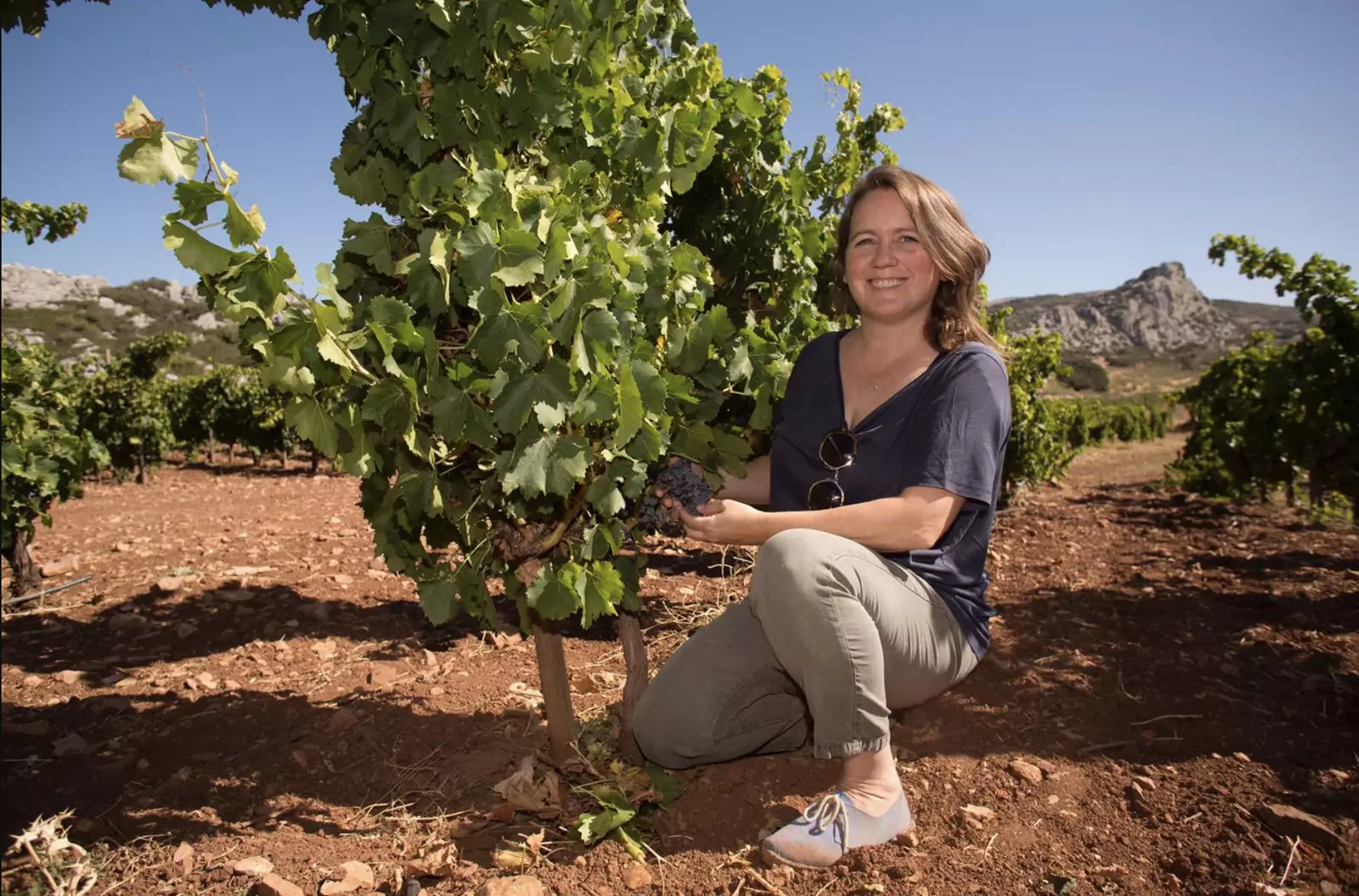
Bibi Garcia, Cortijo Los Aguilares, Ronda.
THE WINEMAKER: BIBI GARCÍA
Sevillana who believes of herself that “I am older than a forest” at 44 years old. Responsible for a team of 15 people in Cortijo Los Aguilares in Ronda, Malaga, a family winery with a very feminine team where "I am the only technician, the person in charge of the vineyard, the elaboration and the commercialization and export".
Despite the fact that she is still considered a young winemaker, García rules the winery and thinks, regarding a day like today, that “talking about gender in terms of ability makes no sense, we women can do what we set out to do”, but she, she nuances her, “M8 is still necessary because there is no equality in salaries and managerial positions”. She explains that Cortijo Los Aguilares belongs to the Large Payments Association of Spain and in the Boards of Directors the only woman has been her, until a second representative has arrived.
"I don't believe in feminine sensibility, sensitivity is human she says and explains that “my husband makes wines that are sometimes much finer than the ones I make”. If there was any doubt…
García has worked her position or, rather, her positions, in the winery: “I am the technical director, but I am also a manager, a partner… I have a polyhedral position. The road has been hard, but I think it would have been the same if I had wanted to be a doctor or a military man, ”she considers.
She remembers that, when she started, in her family and environment they were surprised that she wanted to dedicate herself to wine, to the field where her grandfather farmed. And a woman raised and educated in equality, she finishes her degree and goes to the vineyard, where there is skepticism and mistrust… Machismo, too, "especially when you are climbing in responsibility and It's your turn to send men who are my father's age." she remembers her.
When she was studying Agronomists there were more women than men in class, but they gradually drifted apart; society, she thinks, was doing it. That's why she still needs a day like today. “But, be careful”, she points out, “sometimes around this day feminization is exalted and there are silly biases like "Women's wines..." as if it were something exceptional and only a few would achieve it”. She continues: “And no, we, like them, We make wines from people, from landscapes. We are not Barbies and it seems that, being Barbies, we have been able to make wine… and it is not like that”.
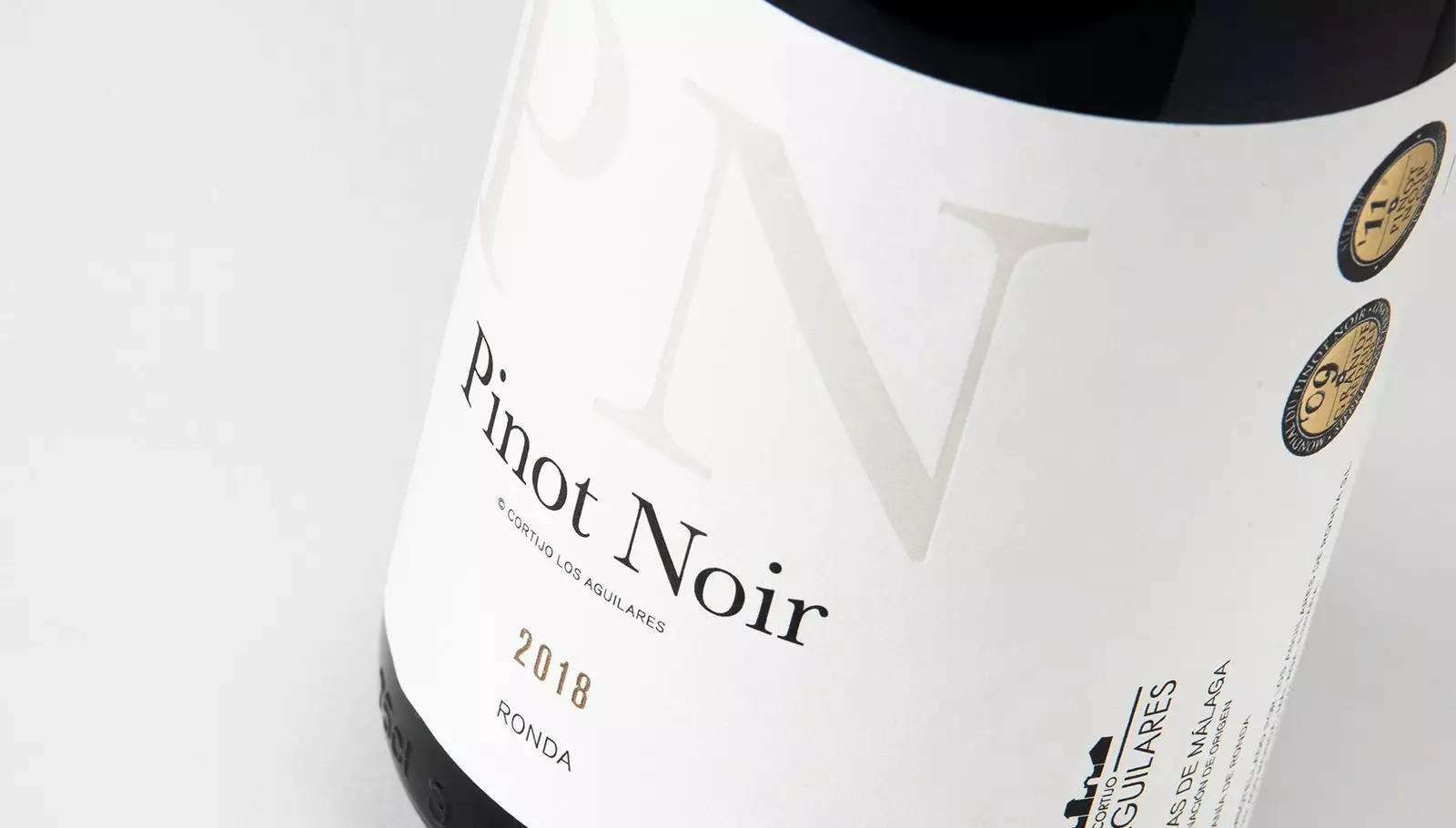
Pinot Noir from Cortijo Los Aguilares.
In the winery, García makes sure that everything works: "I work with a colleague decanting, bottling... harvesting is harder and requires a physical state that over the years I begin to notice that I lack, because there are already 15 grape harvests that I have” , she complains, half jokingly.
"We want to grow moderately, consolidating as quality producers and that the wines, which are recognized locally, be successful outside of Spain, and I also take care of being an ambassador for the brand”. Her Pinot Noir, made with a variety more typical of other latitudes, is considered one of the best in the world and of course, it is one of the most original wines from Spain.
The adopted Malaga has reached where she is as a mother of two children and with the support of her family and her partner, Rodrigo, but she sees Spain as an immature country in terms of equality: "When you have children the professional responsibility ends to spend more time at home”, although she feels lucky to have managed the winery.
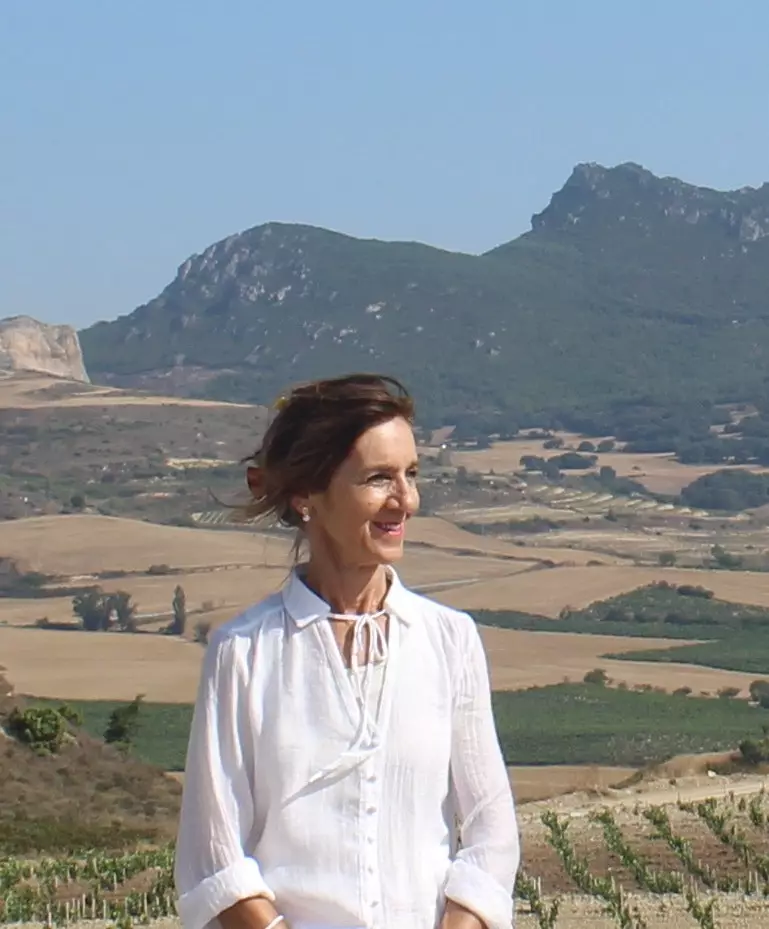
Esperanza Tomás, Bodegas Roda, Rioja.
THE RESEARCHER: ESPERANZA TOMÁS
The R&D director of RODA Wineries in Rioja she has a sign on the door of her office that indicates: “Director”, with A; a small detail, but a great detail, after all. Tomás has a degree in chemical sciences, Master in Viticulture and Oenology and in Production by ESADE and she had some unconventional beginnings in wine: she came for love, through her husband she also fell in love with the vineyard and her surroundings.
In RODA, Tomás, whom she loves to read and play sports In her free time, every day she tastes wines, alone and with her team, she reads, studies the status of projects, collects ideas, travels, looks opportunities and she sees problems in viticulture and tries to solve them. I like to plan the meetings, although we also brainstorm, but I prefer to have everything planned to get the most out of them”.
At RODA, Tomás and her team have launched projects to mitigate the effects of climate change: use of green energies, specifically solar thermal, and also research 'Low PH Wine', in which lower phs are sought (to obtain wines with more acidity) starting in the vineyard and also in the cellar. Another initiative is a new vineyard in Cellorigo (La Rioja), planted with a system that makes better use of rainwater and manages to prevent erosion naturally. It is in a higher area, more limit, because, explains Tomás, "we believe that it is this type of vineyards Where is the viticultural work going to move? due to climate change”. The scientist has respect for the environment in mind at all times: "We have the obligation to leave a world as good or better than the one we found when we arrived."
She highlights that in RODA there are many women working in development of the R&D projects, and tells an anecdote about one of them: “The evaluator commented that there was an imbalance in terms of gender, since the majority of the participants from most of the companies in the team were male, which did not happen in ours, made up of many women, and We provided that balance.”
She comments that she has been able to reconcile work and motherhood thanks to the winery's conciliation policy, and she considers that, although it is necessary to make the professional role of women visible, we are the ones who have no desire for protagonism and she believes that this can also influence us to be seen less: "Personally", she explains, "I do not seek prominence in my work, I want that to have the wine and let him be the one to reflect all that effort and the teamwork behind it”.
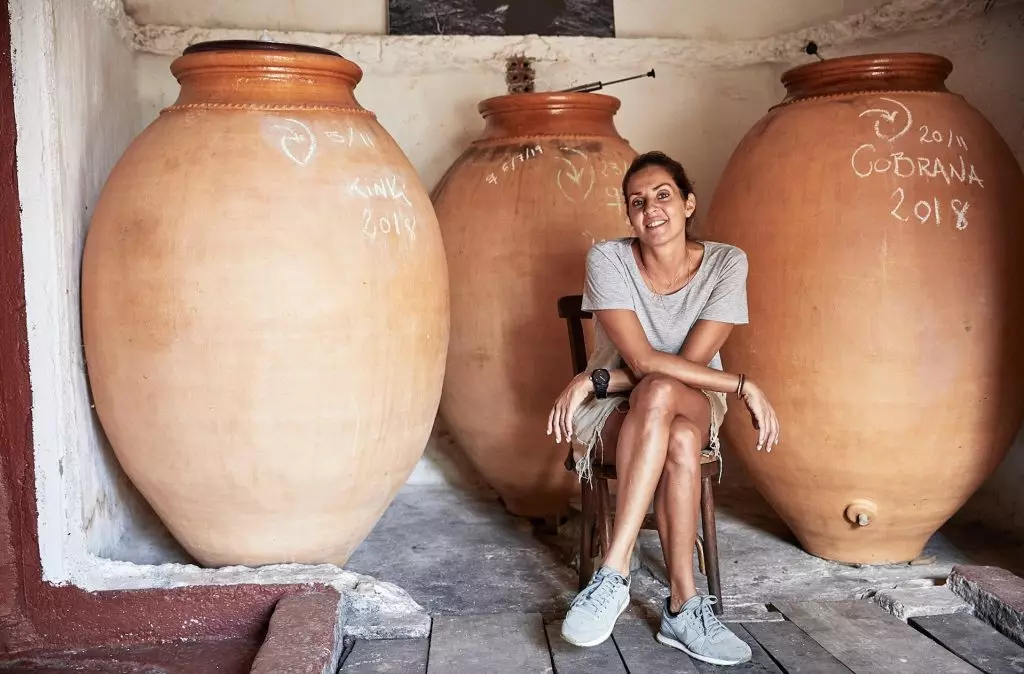
Veronica Ortega, El Bierzo.
THE WINE GROWER: VERÓNICA ORTEGA
I locate her in Mexico, resting, where she is looking for a place to chat. Veronica Ortega she is from San Fernando, Cádiz, daughter of a bullfighter (hence her name) and one of the most appreciated producers of El Bierzo , where she has her house, her dog and her vineyards, which she works with the help of a partner, because doing everything in the winery and taking care of more than five hectares alone would be impossible: “In small wineries you have to do everything: I am a winemaker, a viticulturist, a salesperson, a secretary... my day-to-day work encompasses a thousand things, from attending visits to traveling around Spain and abroad, answering emails, keeping the winery up to date, the countryside... I also I am very relocated because I have vineyards in Valtuille, in Cobrana, and I have the warehouse in two locations, I don't get bored during the day, it's very difficult to find myself standing”, she comments.
Ortega dreams of “make wines that move people as much as they excite me. I want whoever drinks them to value them; that those people who enjoy a wine find in mine something that they like and that makes me feel proud”.
The Cadiz woman finds many charms in her daily work: “I am fortunate to dedicate myself to what I am passionate about, be in contact with the countryside, nature; In addition, this has a creative part, and you have people's feedback, that allows me to learn every year. She sums it up: "It's a beautiful profession, engaging, but demands sooooo much sacrifice and complete dedication.”
In her case, she explains, “I am alone and I do everything myself, I dedicate body and soul to the winery”. In addition, living in rural areas implies, she says, that there are not many young people and, in her case, her family, her people, are far away: "I can go weeks without seeing anyone, and that sometimes needs something very strong to compensate for it, because it is hard”.
Yet in the distance she finds other country women who, like Ortega, have undertaken a small project that is bearing fruit.
She remembers that when she started in the field she had to deal with people older than her, people who she was not used to taking orders from a young woman and, he confesses, “you have to show character, put yourself in your place so that they take you seriously, but when they see you leave your skin, you earn their appreciation, their affection and also their respect”. She recognizes herself lucky because “since there are few women in projects like this, that scarcity, especially at the beginning, has worked in my favor.
Verónica Ortega has found fulfillment in a project built with her hands, away from her house and hers, and she is consolidating it based on hard work and the confidence that she gives knowing that she knows what she wants, despite the fact that in the field that certainty is difficult to achieve 100% but that is also part of its charm.
THE SOMMELIER (MULTIDISCIPLINARY): ROCÍO BENITO
This 28-year-old woman from Valladolid has been a career in the world of wine, to which she has dedicated the last seven, which is comparable to decades in the career of others. She got into wine through the hotel industry, where she started, like so many, because she needed income to pay for her studies. In that first job, she with a boss, Alicia who, in full Valladolid and in establishing it, Villa Paramesa, she dared to have wines beyond Ribera del Duero and she opened magnum bottles for customers, that's where the wine started to catch her eye.
Her restlessness led her, a little over a year later, to Cambodia , where she collaborated to open the first wine store in the country. Willing to lend a hand wherever she went, Rocío Benito saw a nice opportunity in the training of future Cambodian waiters and sommeliers, with the focus on women. “Many there couldn't afford to go to school, because education is private, and they ended up as waiters. I focused on girls because they are usually the ones with the least access to training, and educated them in the service of wine, basic notions of elaboration... That allowed me to explore a new facet, but there we did everything from events to marketing plans, business development… I learned a lot about how wine works in another country.”
When she returned, Benito worked in export for a Spanish winery and later collected in the restaurant from which she keeps one of the best memories of her professional career to date: Lera. “It was my house, a garden, the place where I was very happy”, she remembers her. That was where Rocío, a sommelier by training, made her debut in a room. Luis Alberto Lera and Ramon Blas Gonzalez gave him wings to work with wines and pairings and that was where she began to notice that she liked her sherry better than other wines.
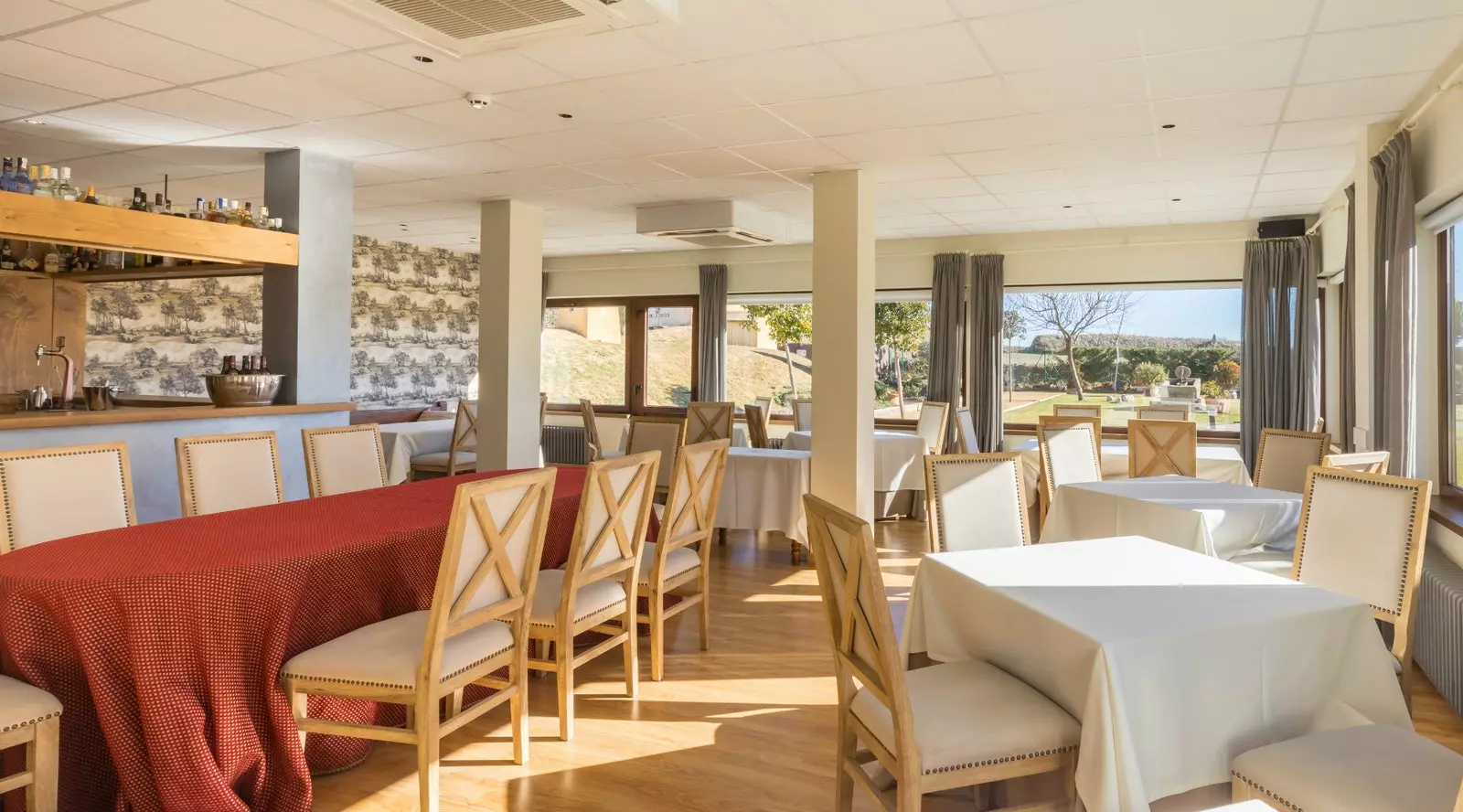
Lera Restaurant, Castroverde de Campos, Zamora.
When she finished her stage at the Castroverde de Campos restaurant, she left to the brand new Ambivium of Penafiel, to work as part of a team in a restaurant where she orders the wine over the food: “We had a wine list with 4000 references, 20 types of glasses, pairings of 34 wines per person”, she comments, and that deployment of hers required, for her, to go from freedom to discipline, the agreed choreography, a jump that Benito did not fit with her vital moment...
And Jerez arrived. She met one of the most relevant producers of the moment, Willy Pérez, and insisted that he let her harvest: “Willy is my mentor, my father in sherry”. During the time that she spent in the field, she also drove vans, went through the laboratory and was in charge of checking the harvest boxes. "That made me see the hard work What's behind a bottle of wine? she assures her.
Afterwards, she settled on Tohqa, in The Port of Santa Maria and from there, she embarks on a project to promote Sherry in which she is now fully involved: "I think that sherry is not communicated as it should be, that the figure of the sommelier as it has been understood is obsolete", she comments, and her goal is to make young people fall in love with the Sherry, a challenge for which she has a team of designers to artists, philosophers and historians. She wants to give her an anthropological and social point of view, in which people have more relevance, with a humanistic approach whose flame was lit by her collaboration with Willy Pérez. “Before she understood wine from the data, the technique, the maps, but not from the social point of view. Being here I see the real difference between Sanlúcar and Jerez, in the social, and that is what I want to convey, ”she explains.
THE STORYTELLER: IRENE GUEDE, THE GARNACHA GIRL
Irene Guede , from San Martín de Unx, she began to study Agricultural Engineering but her destiny led her to audiovisual creation, that she made him train in Communication and ask for a scholarship to the EU to work in the Azores public TV. There, she finds a way to collaborate with an online wine store creating content. She passed through Paris and realized that Pamplona, her land, she called him. "There I could keep in touch with the wine, tell interesting stories and share moments." She went through Basque Culinary Center to do a master's degree and worked at the Bodega Urbana de Bilbao, but his path was in the creation of content related to wine, since copy to videos, social networks or web management.
After becoming a mother (she has twins who are still small) she realized that “I did not want toxic clients, my filter has become thicker and I've put on my violet glasses, now I'm more critical of immobility and the lack of diversity in wine”. She believes that, by communicating, she does not respect the hoteliers, the consumers... and she wants to change that, to contribute, from her work, to leaving a better world for her children.
Guede is very active in networks, warrior and critic, and her vocation, as soon as she listens to it, is to communicate. So it was inevitable that she would end up creating a way to do it her way, something that she came up with. the viticulture podcast phylloxera, together with Julián Palacios, an expert in viticulture, and Gonzaga Santesteban, director of the Department of Agronomy, Biotechnology and Food at the Public University of Navarra. The three share opinions, stories of little-known wine personalities, concepts and even forgotten words about wine: “We want to give and share opinions beyond polarization, not that everything is black or white”.
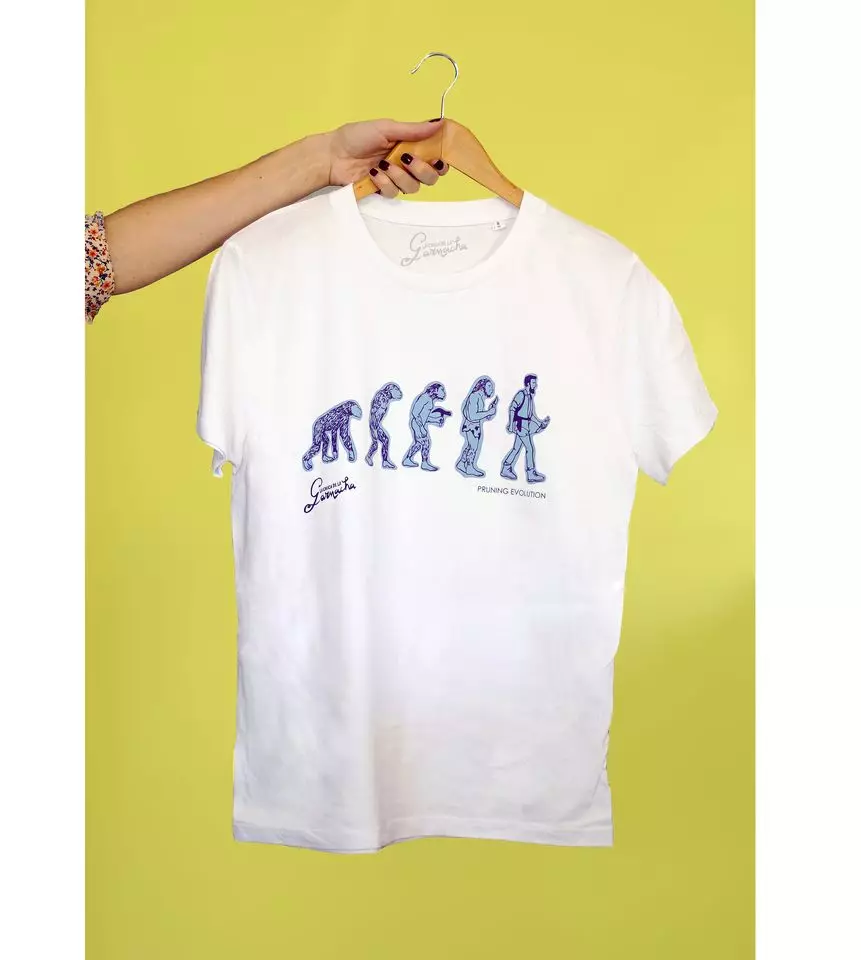
@chicagarnacha t-shirt.
Phylloxera has now reached its third season and is one of the cult podcasts in the world of wine, They have just been released broadcasting on Twitch and their casual tone makes the topics they deal with, sometimes hard for a non-understood person, become close: “That touch of humor that we give makes things easier”, she comments her.
Irene is behind, together with Palacios and Santesteban, the documentary The forgotten pruning, a story of twinning between winegrowers from different origins through pruning, that exercise in the vine that determines its future and its longevity.
As if that were not enough, Guede also makes t-shirts with slogans such as "Pruning badly is expensive" or "The Hashtag is in the vineyard", a nod to the countryside and a critique to those who promote through networks that wine is something luxurious and unattainable; Y “WineWomen”, a vindication of the visible woman and the rejection of the use of the female body, curves or sexuality to sell wine: “It makes me sad that companies communicate using women and their sexuality; the system, which makes it have more likes the more meat they show”.
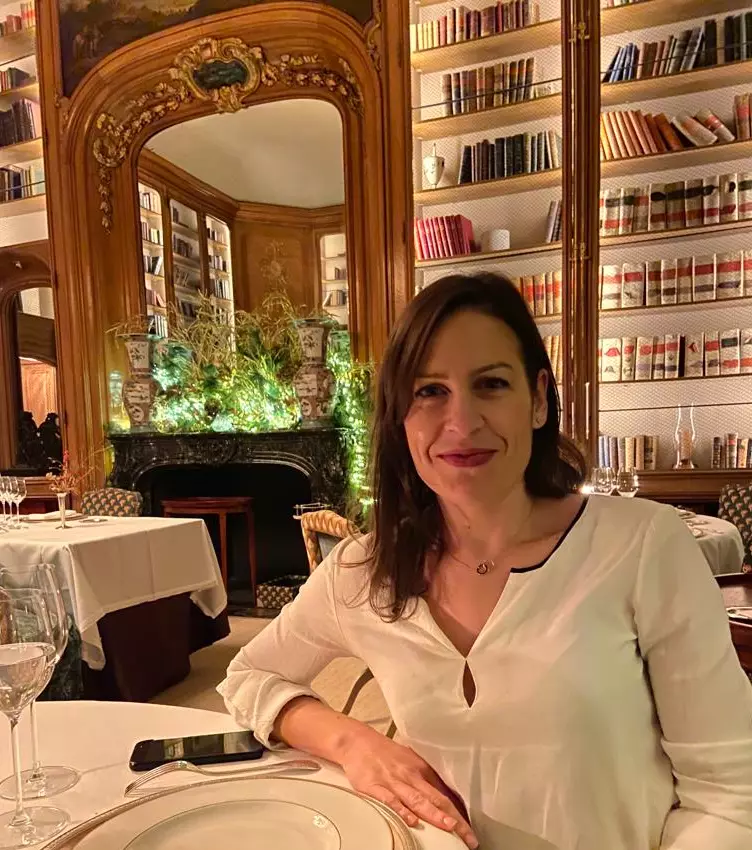
Anne Torrent.
THE CONSUMER: ANA TORRENTE
Anna Torrent she is a professional originally from Huércal-Overa, Almería, authentically passionate about wine. The bug bit her more than a decade ago thanks to a friend of hers who "hooked" her to take a tasting course, and from that tasting came her interest in wine fairs, private tastings. In a natural way, she confesses, she went deeper into discovering varieties, regions, styles, and the wine was catching him until now. “Of course, I have to admit that I take the best part of the world of wine, that of enjoyment always; everything is pleasure and some hangover, too”.
She is clear that "for me wine is very gastronomic, almost always associated with food. I cannot conceive of a great meal without wine; In restaurants, I always keep an eye on the surrounding tables. Being the gossip that I am, I'm glad to see that people enjoy the wine. Yes, there are some most special bottles that I like to drink almost with nothing, with something to nibble, at most, so that the protagonist is the wine”.
Torrent feels curiosity about wines that she does not know and she allows herself to be guided by the recommendations of friends, or chooses bottles that she finds striking, although she usually returns to those wines from regions, varieties or producers that she likes and there she does not risk. Among her favorite producers, the Galician Laura Lorenzo, of whom she is seduced by “the authenticity of her wines”; Recaredo, from Penedès, "for his traditional approach" or Javier Arizcuren from La Rioja for "his finesse and delicacy". She outside of Spain she chooses the Portuguese winery Quinta das Bageiras and her wine of the baga variety, "pure pleasure and on top of that, payable" and to Burgundy producers Alice and Olivier de Moor, "for their purity and depth."
Her wine profile, which she, she confesses, "has nothing to do with what I liked ten years ago" are fresh and light wines. Lately "I've been trying more references from Galicia but also from areas such as Rhône, Piedmont and Rioja". Less they call him sweet wines, but he never gives up a champagne and he sees sparkling wines as "an option in any situation and with any meal" because of "that festive point of the bubble", which he loves, he says.
Around wine, Ana Torrente also organizes trips to areas like Bordeaux, loire, Rhône or the Portuguese Dao and Bairrada. He has pending Piedmont, where he plans to go this year, and when he is in these regions, he visits wineries, gets to know towns in depth and tastes their gastronomy.
He recognizes that, when buying wine, he chooses internet “for convenience” and "as soon as I see a hole in the cellar, I start looking for references that I have not tried and I have pending", although he also browses the stores and "something always falls". It has been done with a collection of a hundred wines that he carefully stores in his wine cellar, some of them, to keep them "for the pure expectation that in a few years they will be better", although he warns that it is possible to take a disappointing surprise if, when opening the wine, it turns out that it has a defect: “That's the worst”, she concludes.
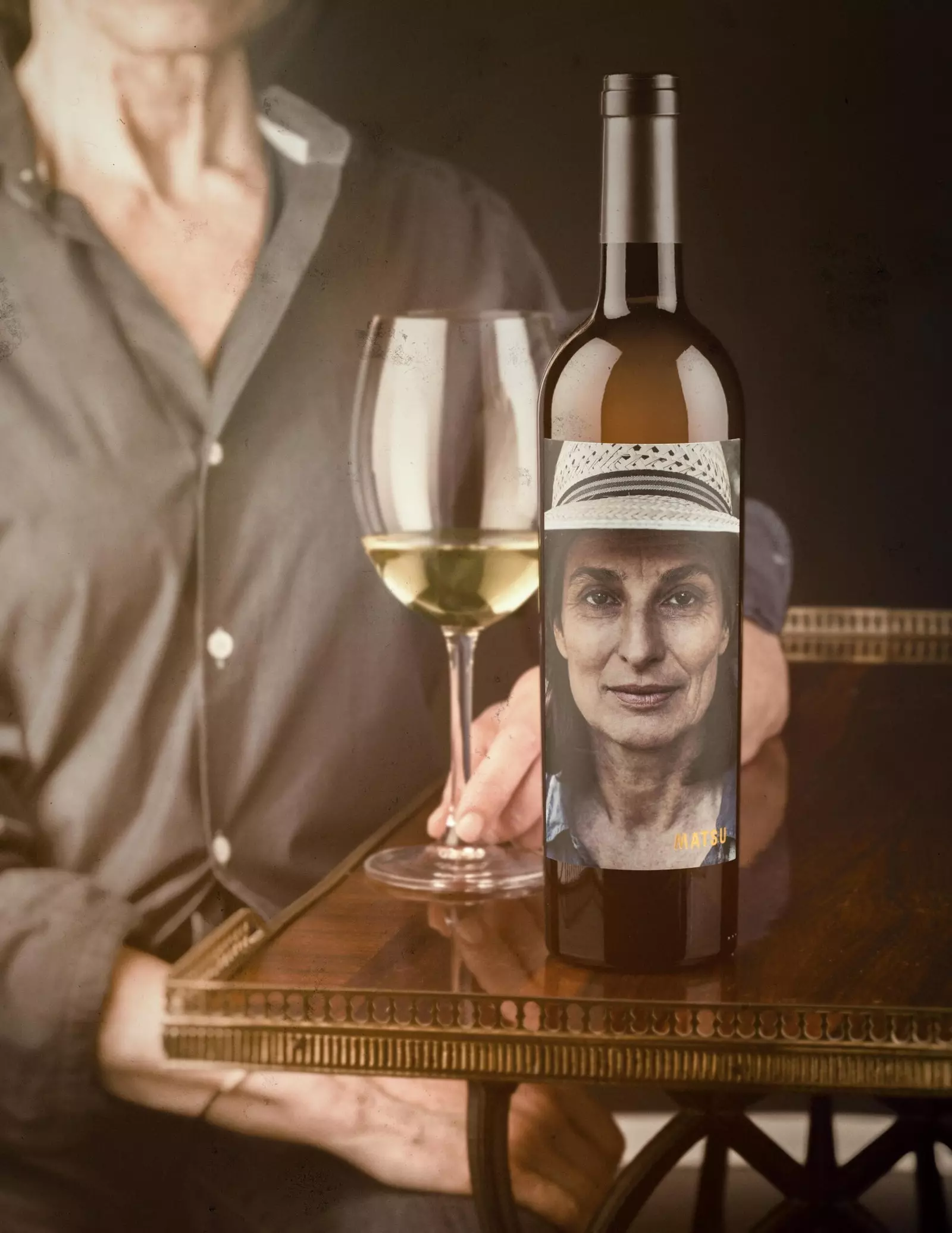
The Boss, Bodega Matsu, Toro.
THE WINE: THE BOSS
With a woman's face but without a specific name, this malvasia white Matsu Winery, Bull breaks stereotypes about the fake "women's wine" or "for women". Power, intensity, maturity, volume... It is not a wine for women, but it is a tribute to those who work the fields, sacrifice, know, know, elaborate... women, nothing more, nothing less.
